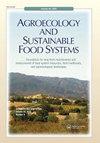Optimization of hatchability and survivability traits of indigenous duck managed under backyard farming system
IF 2.6
3区 农林科学
Q1 AGRICULTURE, MULTIDISCIPLINARY
引用次数: 0
Abstract
ABSTRACT An extensive field study was made in subtropical hot humid climate of north-east India to identify the most influencing climatic and human-made environmental factors and their effects on hatchability of eggs and survivability of indigenous ducklings hatched through indigenous broody hen (chicken) managed under a backyard farming system. Hatchability and survivability ratio was estimated from 858 batches duck eggs recorded from 220 marginal/landless duck farmers over a period of 24 months. Statistical analysis by fitting fixed effect general linear models revealed that the ambient temperature and relative humidity were the most critical climatic factors that affect the hatchability ratio of duck eggs and survivability ratio of ducklings. Besides, the human-made factor was also found to be associated with variations of the hatchability and survivability performances of duck under broody hen incubation. Thus identification of these factors and their effects on the studied traits would be helpful to provide appropriate season-based management strategies for economic and sustainable duck production in rural backyard farming systems. The present finding could be a valuable insight for duck farmers not only in north-east India but also in other developing countries with a subtropical hot humid climate with prevailing backyard duck production systems.后院养殖制度下土鸭孵化性和生存性的优化
摘要在印度东北部的亚热带湿热气候中进行了广泛的实地研究,以确定最具影响的气候和人为环境因素,以及它们对通过后院养殖系统管理的本地母鸡(鸡)孵化的本地雏鸭的蛋孵化率和生存能力的影响。孵化率和存活率是根据220名边缘/无地鸭农在24年内记录的858批鸭蛋估计的 月。通过拟合固定效应一般线性模型的统计分析表明,环境温度和相对湿度是影响鸭蛋孵化率和雏鸭存活率的最关键的气候因素。此外,人工因素也与孵化母鸡时鸭子孵化能力和生存能力的变化有关。因此,识别这些因素及其对所研究性状的影响,将有助于为农村后院养殖系统的经济和可持续的鸭子生产提供适当的季节性管理策略。这一发现不仅对印度东北部的养鸭户,而且对其他亚热带湿热气候、后院养鸭生产系统盛行的发展中国家的养鸭者来说,都是一个有价值的见解。
本文章由计算机程序翻译,如有差异,请以英文原文为准。
求助全文
约1分钟内获得全文
求助全文
来源期刊

Agroecology and Sustainable Food Systems
AGRICULTURE, MULTIDISCIPLINARY-GREEN & SUSTAINABLE SCIENCE & TECHNOLOGY
CiteScore
4.80
自引率
7.70%
发文量
73
期刊介绍:
Agroecology and Sustainable Food Systems is devoted to the rapidly emerging fields of agroecology and food system sustainability. By linking scientific inquiry and productive practice with transformative social action, agroecology provides a foundation for developing the alternative food systems of the future. The journal focuses on the changes that need to occur in the design and management of our food systems in order to balance natural resource use and environmental protection with the needs of production, economic viability, food security, and the social well-being of all people.
Agroecology and Sustainable Food Systems examines our current food systems from production to consumption, and the urgent need to transition to long-term sustainability. The journal promotes the study and application of agroecology for developing alternatives to the complex problems of resource depletion, environmental degradation, a narrowing of agrobiodiversity, continued world hunger, consolidation and industrialization of the food system, climate change, and the loss of farm land. The journal uses a food systems approach, and seeks experiences in agroecology that are on-farm, participatory, change-oriented, and backed by broad-based methodologies of sustainability analysis and evaluation.
 求助内容:
求助内容: 应助结果提醒方式:
应助结果提醒方式:


